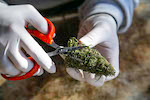The Princeton Council will pick up where it left off in its discussion on whether to allow retail cannabis stores to open in town at a special Princeton Council meeting, set for March 29 at 7 p.m.
The Princeton Cannabis Task Force issued its report recommending up to three cannabis retail stores in November 2021, drawing criticism and praise from attendees at the Princeton Council’s Nov. 21, 2021, meeting.
A special Princeton Council meeting was set to place in January to continue the discussion from the November 2021 meeting, but it was postponed. The meeting had been announced at the council’s Dec. 21 agenda-setting meeting, but a date was never established.
The March 29 special meeting is intended to allow all voices to be heard on the issue of allowing cannabis stores in Princeton, said Princeton Councilwoman Eve Niedergang. She chairs the Princeton Cannabis Task Force.
The meeting is for discussion purposes only, and not a decision-making meeting, Niedergang said. No formal action will be taken.
“We are trying to ensure that all of those who want to weigh in on this issue will get a chance to do so,” Niedergang said of the March 29 meeting.
There will be some presentations for about an hour, including time for a concerned parents group to make its presentation. There will be an opportunity for more public comment, she said.
The Princeton Cannabis Task Force was appointed to study the retail sale of cannabis, following a state-imposed deadline of Aug. 21, 2021, to decide whether to permit the retail sale, cultivation, manufacturing, wholesaling, delivery and distribution of cannabis.
The Princeton Cannabis Task Force recommended five commercial areas that could be zoned to permit cannabis retail businesses: the area around the Dinky train station on lower Alexander Street; the Jugtown neighborhood on east Nassau Street; the Central Business District; Witherspoon Street, between Green Street and Leigh Avenue; and Route 206, near Cherry Valley Road.
There would be no minimum distance from churches, playgrounds and parks, but the proximity of cannabis stores to schools would mirror the regulations for liquor stores. A liquor store must be at least 200 feet away from a school.
The federal drug-free zone around schools is 1,000 feet, but task force members said that since there is no evidence that the 200-foot requirement for liquor stores led to underaged drinking, the same 200-foot standard should apply to cannabis retail stores.
Meanwhile, opposition to the proposal to allow up to three cannabis retail stores has picked up steam. A petition, signed by more than 800 people on change.org, opposes allowing the stores to be located near schools, playgrounds and residential neighborhoods.
The petition states that children and adolescents who use cannabis or marijuana can suffer impairments in learning, decision making and cognitive functioning. It may also result in lower academic performance. Studies have shown the effects are more severe than for alcohol, it states.
Representatives from the Princeton Public Schools also weighed in on the issue. The school board sent a three-point position statement on allowing cannabis dispensaries in town to the Princeton Council in December 2021.
The school board urged the Princeton Council to adhere to the 1,000-foot buffer, or drug-free zone, around schools. New Jersey has legalized cannabis, but it is still illegal to possess or sell it under federal law.
The school board’s position statement acknowledged that state law allows a dispensary to be located closer than 1,000 feet to a school, but there is no law that would require the town to do so – nor is there a law that would stop the town from voluntarily adhering to the federal drug-free school zone buffer.
Its second point stated that the school district should receive a portion of the 2% sales tax proceeds from the sale of cannabis at dispensaries. The money would be used to pay for school and public information campaigns about cannabis and its effects on the adolescent brain.
In its third and final point, the school board’s position statement sought a commitment from the Princeton municipal government, the Princeton Police Department and the cannabis dispensary owners to enforce state law to ensure that no sales would be made to anyone under 21 years old, which is the minimum age to purchase cannabis.

